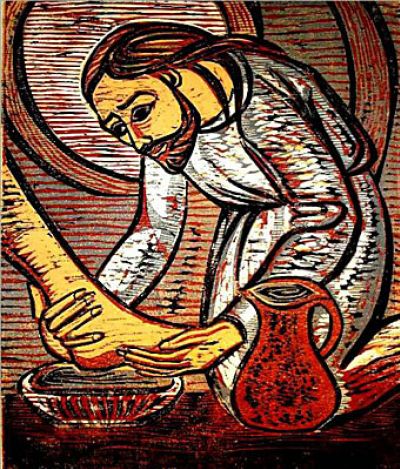

Exodus 12:1-14
Psalm 116:12-18
1 Cor 11:23-26
John 13:1-15
|
Jesus ... rose from supper, laid aside his garments, and girded himself with a towel.
In the Name of the Father and of the Son and of the Holy Ghost. Amen. |
According to the best sources that have survived — and please remember that Middle Eastern Antiquity did not share our sense of posterity or of record-keeping — according to our best sources, Joseph did not want the responsibility of caring for the young, devout virgin, Mary. The various Hollywood (or even Ignatius Press) movies notwithstanding, Joseph was an old man. He had boys at home who were Mary's age. Having a young girl in his care (and this of all girls, renowned for her personal holiness!) simply did not fit into his daily life and world. He even feared the jibes we would take from his own sons. But he was confronted and challenged by other devout Jewish men of the Temple, "Will you strive against God?!" And so he relented.
Who could have realized then what God could see from the beginning: how perfectly Joseph's family and background would set the stage for the drama, which lay ahead? The Evangelists Matthew and Luke could see some aspects of it — the descent from David, the outcasts in his genealogy, who pointed to a compassionate savior ... but this evening let us focus on Joseph's ancestor Ruth.
The Hebrew meaning of the name is companion. The English meaning of ruth is grief, from our verb to rue. But it has come to mean the sorrow we feel for another, or to say it more simply, compassion." And it is hard to believe that the Biblical story of Ruth is not related to our usage of the word today: consider Milton's phrase, "to melt with ruth."
You recall the story. Ruth was an outcast in the eyes of the Jewish world — a Moabite, who married a Jew. And when her husband, his brother, and their father all died, it would be her mother-in-law Naomi, who faced a life of destitution. For a woman who had no husband nor sons to care for her became the face of the blasted and the lost. We have seen this face sitting on curbstones in our major cities. Moreover, Naomi was a lifetime separated from, and many, many miles away from her Jewish homeland. The Moabite Ruth was not at hazard. As Naomi reminded her, she could still return to her mother's house and meet with a second proposal of marriage (Ruth 1:8). Nonetheless, Ruth would not abandon Naomi, who, as Ruth saw, faced the collapse of her security and a life of peril. Her words at this most poignant moment — as Naomi tries to persuade her to return to her mother's house and she steadfastly refuses, turning her back on all her future prospects, are among the most cherished in all of Scripture:
|
For whither thou goest, I will go; and where thou lodgest, I will lodge:
thy people shall be my people, and thy God my God: Where thou diest, will I die, and there will I be buried: the Lord do so to me, and more also, if ought but death do part thee and me. |
Now, on a slightly different note, search the New Testament for a more complete and precise pledge of ... discipleship. You will not find it anywhere. To be sure, Ruth is not Naomi's disciple, nor Naomi Ruth's master, only her mother-in-law. But this daughter-in-law's heart and integrity are extraordinary, even heroic. Now think of Jesus' disciples. They, too, ought to follow the Lord everywhere and anywhere that He might go — not bargain for a choice position in His kingdom; not demand a sign ... and then another and another; not complain about the depth or scope of their sacrifices; but simply to make the pledge of Ruth to Naomi:
|
Thy God will be my God: I accept what you have told me about the Father and the Son.
Wither Thou goest, that is where I will go. Where Thou lodgest I will lodge. Where Thou might meet with death, there will be the place of my own death. |
|
How beautiful upon the mountains
are the feet of him who brings good tidings, who publishes peace, who brings good tidings of good, who publishes salvation, who says to Zion, "Your God reigns." |
I suppose feet have always been the icon of faithfulness and always will be. My first bishop told me that he assessed a priest on the basis of his "shoe leather." He took my shoe and looked at the bottom and said, "Yes, you have some miles on these!" Or we might use the colloquial term: whether a priest "walked the walk." Was he tireless in his rounds at the hospital? Was he faithful in visiting parishioners in need? Could he be seen downtown at the soup kitchen serving the poor? And, if any disciple's feet have gone stray, this too must be carried along with the rest, for wherever one has gone .... well, irretrievably that is where one has been. Yes, we can always retrace our footsteps, but we can never erase them. And if God should wash our feet, He alone would have the power to see all the places they had been, both the holy and the unholy, the faithful and the unfaithful, the keeping-to-the-straight-and-narrow and the wandering-by-the-way.
Speaking of Jesus' Disciples, St. John relates "He loved them to the end."
|
Then He poured water into a basin, and began to wash the disciples'
feet, and to wipe them with the towel with which He was girded. |